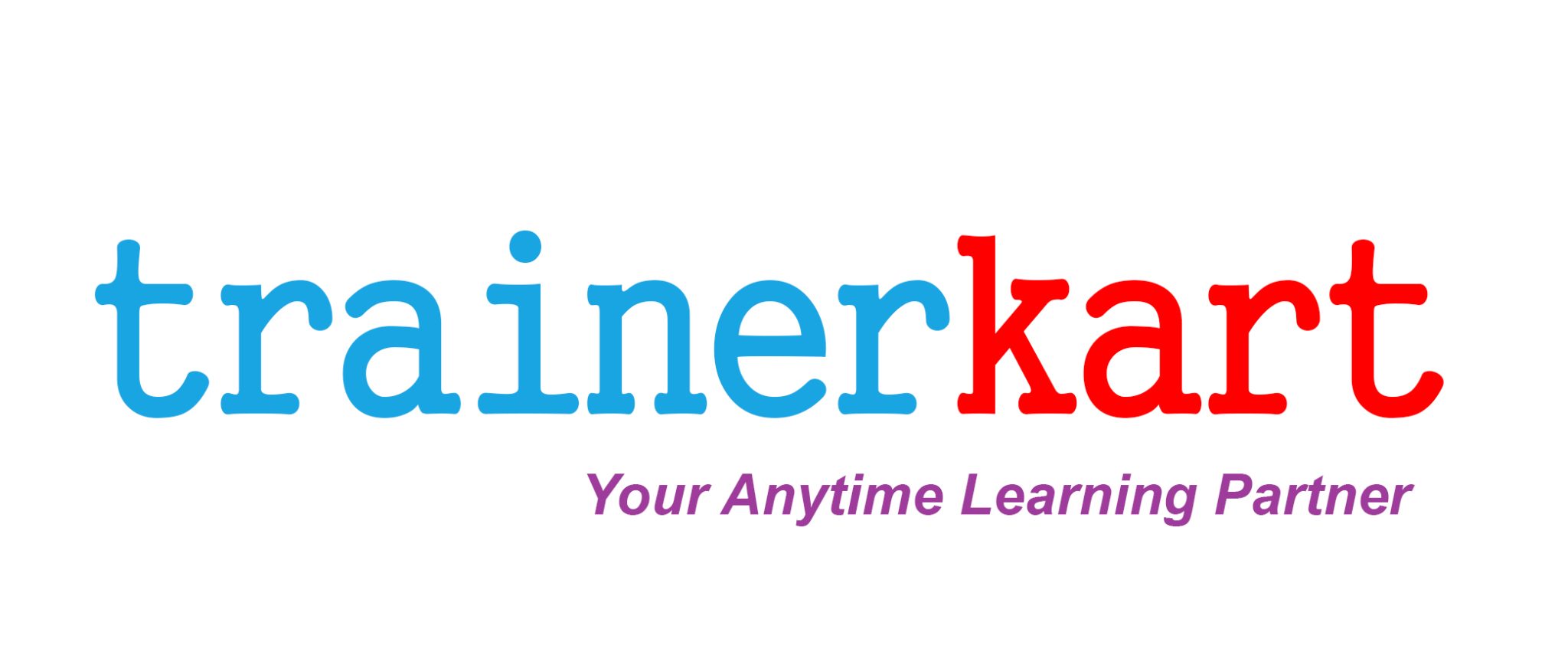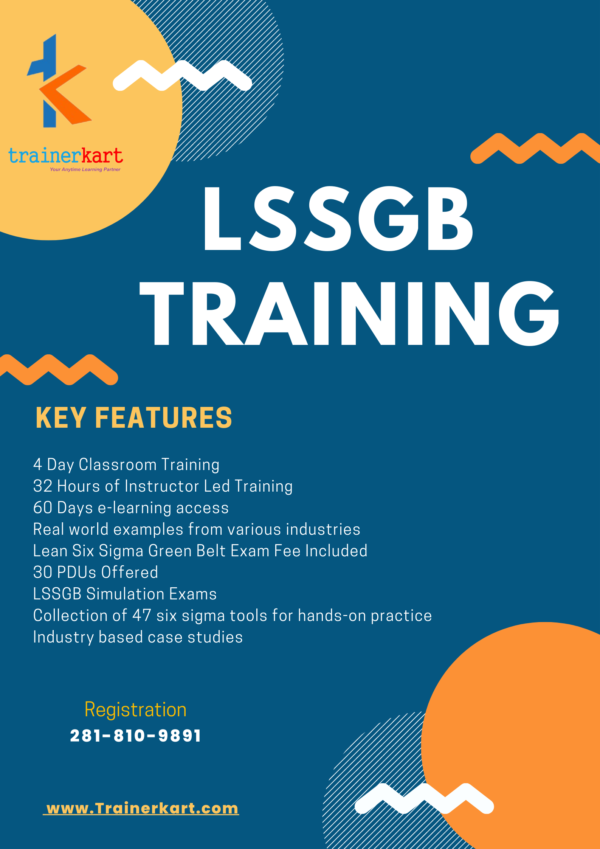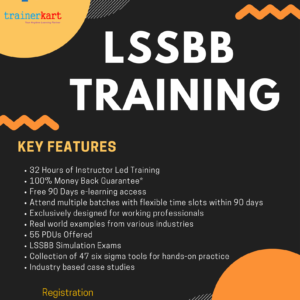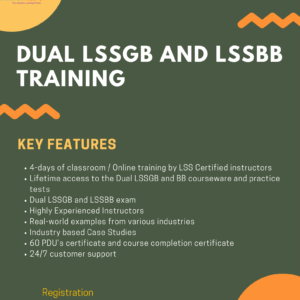Lean Six Sigma Green Belt Training
Introducing Lean Six Sigma Green Belt Training (LSSGB), an exceptional course package designed for ambitious professionals aspiring to build a successful career in the quality sector. This comprehensive training equips Lean Six Sigma Green Belt professionals to effectively develop and lead project teams, steering Lean Six Sigma projects from inception to completion.
The training focuses on all aspects of DMAIC and equips participants to execute and interpret Six Sigma tools while integrating Lean principles. Emphasis is given to understanding statistical and Lean tools, empowering individuals to proficiently apply them in real-world scenarios.
Learning Benefits of Trainerkart’s Training:
Trainerkart’s Lean Six Sigma Green Belt Training introduces participants to the fundamental concepts of Lean Six Sigma, extensively covering both Lean and Six Sigma methodologies. The course places substantial emphasis on all stages of DMAIC. By the end of the training, participants will be able to:
- Discuss the basics of Lean Six Sigma.
- Identify improvement projects during the Define phase.
- Measure processes and products in the Measure phase.
- Analyze data and conduct hypothesis testing in the Analyze phase.
- Propose improvement actions to address variations in the Improve phase.
- Define efficient operating levels for inputs and outputs in the Control phase.
- Utilize DFSS Tools such as Quality Function Deployment (QFD), Failure Mode and Effects Analysis (FMEA), and Risk Priority Number (RPN).
- Perform hypothesis testing with normal and non-normal data.
- Describe Design of Experiments (DOE).
- Employ Lean tools for process control.
Career Benefits:
Becoming a Certified Lean Six Sigma Green Belt professional with practical exposure to Lean Six Sigma tools significantly elevates career prospects. According to Indeed.com, the national average salary for a Certified Green Belt in the United States is $72,000 per year. The certification enhances skills and opens up opportunities for roles like Quality Manager, Quality Analyst, Lean Consultant, Quality Assurance, and Quality Control. Top companies across various industries have adopted Lean Six Sigma concepts, resulting in an increased demand for certified professionals.
Top companies like GE, AlliedSignal Corporation, McKesson Corporation, 3M, AXA, Cognizant Technology Solutions, Ford Motor Company, Glaxo SmithKline, Honeywell, HSBC Group, Motorola, Wipro, Xerox, and many more have invested in implementing Lean Six Sigma concepts. Thereby, they have increased the number of opportunities for Lean Six Sigma certified professionals.
Join us on social media platforms— Facebook, Twitter, LinkedIn, Google+, YouTube – to share your experience with our Lean Six Sigma Green Belt Training.
Lean Six Sigma Green Belt Training – Key Features
- 4 Day Classroom Training
- 32 Hours of Instructor Led Training
- 60 Days e-learning access
- Real world examples from various industries
- Lean Six Sigma Green Belt Exam Fee Included*
- 35 PDUs Offered
- LSSGB Simulation Exams
- Collection of 47 six sigma tools for hands-on practice
- Industry based case studies
FAQ
Is Minitab installation necessary before starting the course?
No, Minitab installation is not required to begin the LSSGB course by Trainerkart.
Will I receive Excel sheet templates if I do not have Minitab installed?
Yes, we provide a toolkit in the course package that includes various tools and Excel sheets used in the context of Lean Six Sigma.
How is Trainerkart’s Lean Six Sigma Green Belt Training different from Certified Six Sigma Green Belt Training?
Trainerkart’s Lean Six Sigma Green Belt Training emphasizes Lean Six Sigma methodologies, tools, and techniques. It strongly focuses on understanding Lean principles and integrating them with Six Sigma practices to enhance process efficiency and reduce waste. Our Certification Exam aligns with certifying bodies like ASQ, gaining recognition across industries and holding higher credibility.
Is a project completion necessary for the Lean Six Sigma Green Belt Training?
No, there is no requirement for project completion to finish the Lean Six Sigma Green Belt Training by Trainerkart.
Will I receive a certificate after completing the Lean Six Sigma Green Belt Training?
Upon successful completion of the Lean Six Sigma Green Belt Training with Trainerkart, you will receive a course-completion certificate. Additionally, upon passing our internal Green Belt Certification Exam, you will be awarded the Green Belt Certificate, widely recognized across various industries.
What learning elements are included in this Lean Six Sigma Green Belt Training?
Trainerkart’s Lean Six Sigma Green Belt Training (LSSGB Training) includes:
- 1 introductory lesson and 6 core lessons, with each lesson covering one aspect of DMAIC
- 72 end-of-lesson quizzes
- 106 real-world examples from various industries
- Case studies covering comprehensive scenarios
- Exclusive versions of Glossary and Acronyms related to Lean Six Sigma
How does the refund process work?
For more details on the refund process, please visit our Refund Policy and Cancellation Policy. (*Under Terms and Conditions)
About the Course:
Lean Six Sigma combines the best of Lean concepts and Six Sigma tools, promoting value generation focus while maintaining statistical rigor. Trainerkart’s Lean Six Sigma Green Belt (LSSGB) training equips aspiring professionals to proficiently lead projects, integrating Lean and Six Sigma methodologies for optimal results.
Exam And Certification
To become a Certified Lean Six Sigma Green Belt through Trainerkart:
- The certification exam is part of our training package.
- The online exam comprises 100 multiple choice questions with a 120-minute duration.
- A minimum score of 60% is required to obtain the certificate.
- No negative marking for wrong answers.
- Current Pass Rate: 98%
For IASSC or ASQ Certification, the third-party exam fee is not included in our courses.
IASSC or ASQ Certification:
Third party Exam Fee is not included in our courses.
What are the prerequisites for the certification?
A basic understanding of Lean and Six Sigma tools is required, with additional working knowledge of the DMAIC approach being advantageous.
Course Agenda: Lean Six Sigma Green Belt Course
Introduction to Lean Six Sigma
- History of Quality (Deming, Juran, JIT, Ishikawa, Taguchi, etc.)
- Evolution of Six Sigma
- Defining Six Sigma – philosophy and objectives
- Overview of Six Sigma DMAIC process
Stakeholders & Setting up a Lean Six Sigma Project
- Identifying and documenting stakeholder requirements
- Identifying stakeholders and customers
- Data collection and analysis
- Determining critical requirements
- Project Selection Criteria
- Identifying performance metrics
- Using financial criteria to evaluate project benefits
- Maximizing project benefits for the organization
Project Planning
- Creating Project Charter
- Charter Negotiation
- Managing Team Dynamics
- Initiating teams
- Stages of team evolution
- Maslow’s hierarchy of needs
- Motivation Techniques
- Conflict Resolution Techniques
- Management / Leadership styles
- Roles played by people in a project
- Important project management & planning tools
Lean Six Sigma Methodology – Define
- Inputs – Need for Six Sigma project, Executive management sponsorship, core team
- Identified Tools
- Organization hierarchy
- High level process maps
- High level Pareto charts
- Idea generation and categorization tools
- Outputs
- Project charter
- Established metrics
- Problem statement
- Roles & responsibilities
Lean Six Sigma Methodology – Measure
- Objectives of Measure Phase
- Inputs – the outputs of the Define phase
- Tools
- Data collection tools and techniques
- Measurement scales
- Validation techniques (Gauge R & R)
- Statistical distributions
- Data mining
- Run charts
- Process map
- Stakeholder tools
- Process costs
- Outputs
- Well defined processes
- Baseline process capability
- Process parameters affecting CTQs
- Cost of poor quality (COPQ)
- Measurement system
Lean Six Sigma Methodology – Analyze
- Objectives of Analyze Phase
- Inputs – outputs of the Measure phase
- Tools
- Ishikawa diagram
- Failure mode and effects analysis
- Hypothesis testing
- Process capability study
- Outputs
- Important causes of defects
- Special and common causes of variation
- DPMO and sigma level
Lean Six Sigma Methodology – Improve
- Objectives of Improve Phase
- Inputs – outputs of the Analyze phase
- Tools
- Returns on investment
- Solution design matrix
- Design of experiment
- Taguchi robustness concepts
- Response surface methodology
- Project planning and management tools
- Prototypes
- Outputs
- Cost / benefit for different solutions
- Selection of solutions for implementation
- Implementation plan
Lean Six Sigma Methodology – Control
- Objectives of Control Phase
- Inputs – outputs of the Improve phase
- Tools
- Control plan
- Statistical process control
- Lean enterprise
- 5S
- Kaizen
- Kanban
- Total productive maintenance
- Measurement system reanalysis
- Outputs
- Implemented solutions
- Revised measurement system
- Control plan for sustaining benefits
- Improved process capability
- Lessons learned
More on Lean
- Lean is speed
- Value stream map
- Total supply chain
- Lean Six Sigma logistics
- Standard operations
- Operator work instructions
- Cycle time reduction and talk time
Case Study
- Case Study Part 1
- Case Study Part 2
- Case Study Part 3




Amanda Mieres
Trainerkart’s LSSGB Course are very focused to its objectives and have a very precise and rich content. The instructor starts the topic from basics and then take you through deeper into the details of the topic.
Michael J
The structure of the LSSGB course is very organized which helps to learn in steps. I recommend Trainerkart to professionals looking for this course.
Brian
I participated the instructor led online class. My experience with Trainerkart was informative and I learn the aspects of D.M.A.I.C. very well. The instructor was very friendly, have the patience to understand our issues and eagerly clarify my doubts. It helped me sharpen my knowledge and skills.
Chris Khong
The training and course materials useful. Its was a good experience. The instructor was very informative and knowledgeable and the responsiveness of the support team was commendable.